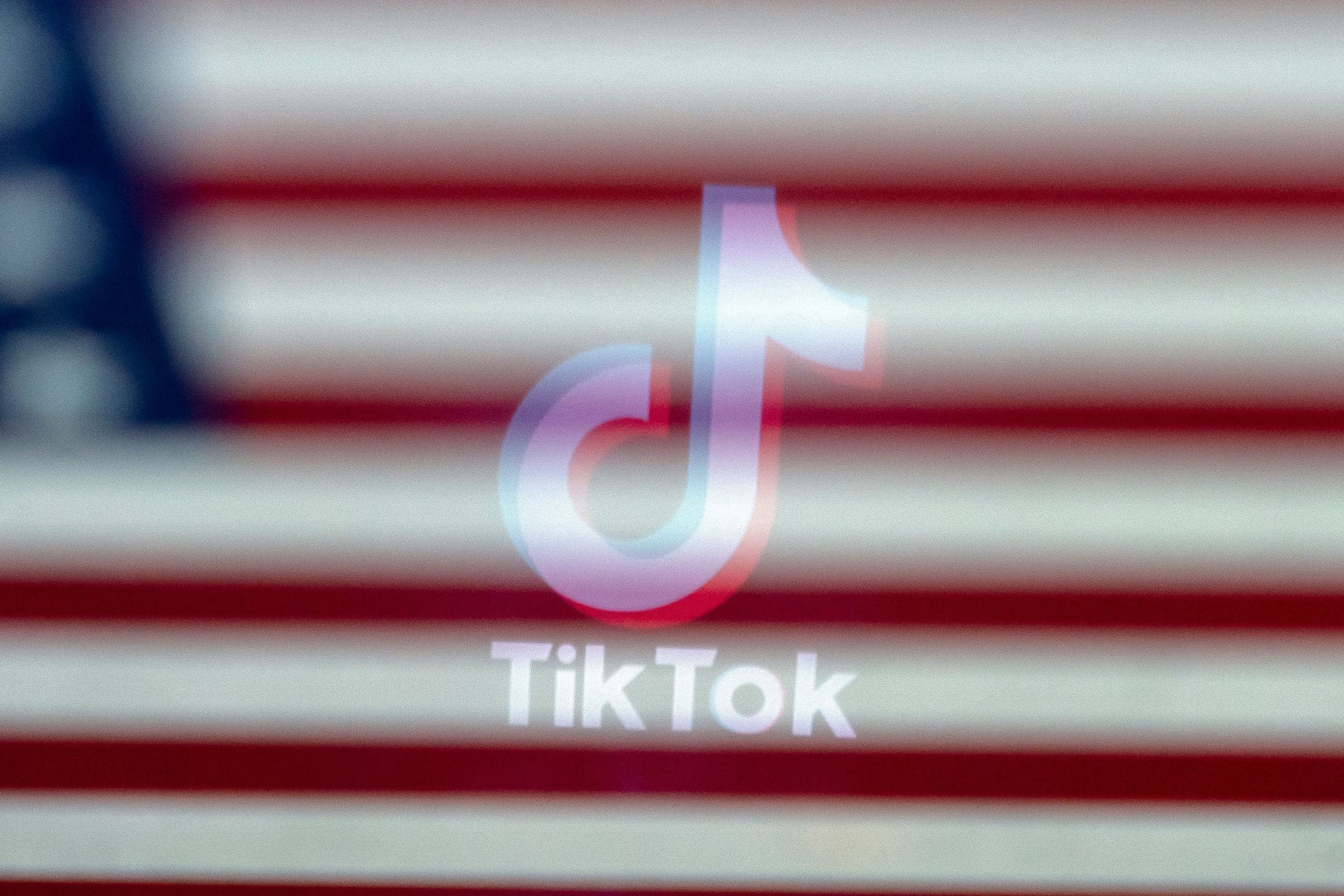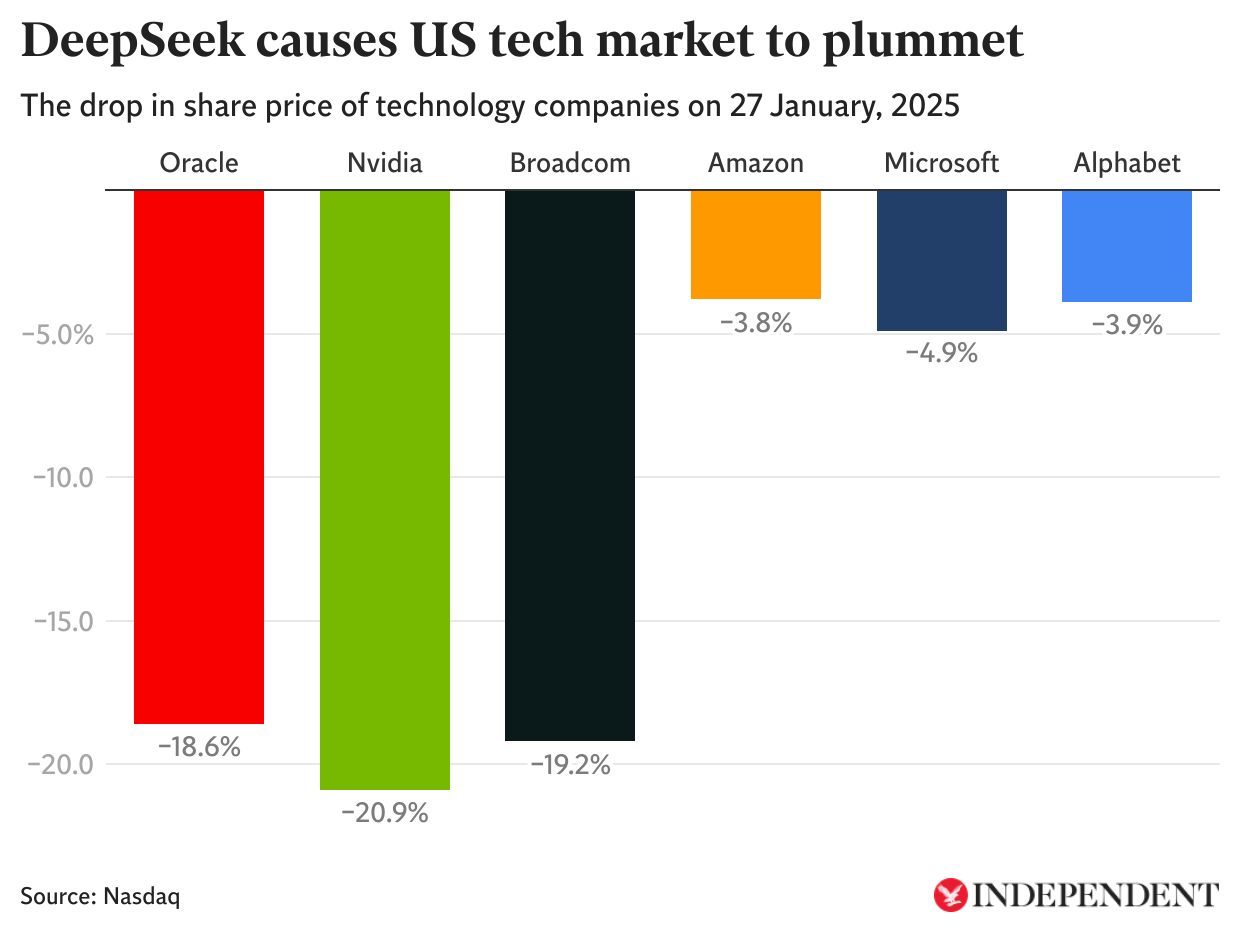A TikTok or DeepSeek ban is pointless - only a Great Firewall of America will work now
Amid calls to limit Chinese apps in America, DeepSeek and RedNote have proved that Trump’s tariffs won’t stop China’s technological rise. This is the US’s “Berlin Wall” moment, writes Anthony Cuthbertson


For a few days in mid January, something happened on the internet that had never happened before – at least not on this scale. Millions of web users in the US and China came together on a single platform to chat, share memes and send each other pictures of their pets.
The unexpected cultural exchange came as a result of an impending ban of TikTok in the US, brought about by concerns related to the app’s ties to China. The Justice Department called TikTok “a threat to national security”, claiming it could be used to spread propaganda and spy on citizens.
But the alternative to the viral video app that the self-proclaimed “TikTok refugees” found was RedNote, an app with even deeper ties to China. Around 3 million Americans signed up to join in the days leading up to the ban, and they received a friendly welcome from the app’s 300 million existing users.
A Chinese user said in a video: “It’s honestly insane, no-one would have expected that we could meet like this one day, openly communicate like this.”
When another asked for help with her English homework, she received more than 500 replies offering assistance. A ‘tax’ was even set up for the influx of American users – cat photos.
The online love-in spread to other apps, with Duolingo seeing a sudden 200 per cent surge in its user base. “Oh so NOW you’re learning Mandarin,” the company posted on social media.
Some even referred to it as “2025’s Berlin Wall” moment, with RedNote offering US users a peek through the cyber barrier that usually separates the two countries, known as China’s Great Firewall. These restrictions heavily censor what people can post or read about on the internet, with websites like YouTube, Facebook and Wikipedia blocked for the 1.4 billion people living there.
Even TikTok, which is owned by a Chinese firm, is not available in China. The app’s parent company ByteDance has a separate app called Douyin for Chinese users, which itself is not available in the US.
.png)
That makes RedNote a rarity – forming a bridge over China’s Great Firewall that allows netizens on both sides to interact.
“This is a pretty strange moment,” wrote one user. “It’s the first time in a very long time that Chinese and American netizens are freely interacting without an intermediary or VPN (virtual private network). I doubt it will last long before XHS (RedNote) splits them apart. But I hope they don’t. It’s genuinely beautiful.”
Incoming US President Donald Trump eventually signed an executive order that gave TikTok a 75-day reprieve, meaning ByteDance has until April to find a US-based buyer for its American operations in order to avoid being taken down.
But on the day Trump signed the order, another Chinese-owned company called DeepSeek launched their latest version of its app: An AI chatbot that offered similar capabilities to those built by US companies – but built at a fraction of the cost.
Within a week of Trump’s inauguration, DeepSeek had dethroned ChatGPT at the top of the app charts, sending the US tech industry into a trillion dollar tailspin. A small group of researchers, on a relatively miniscule budget had been able to create something that took the likes of Meta and OpenAI billions of dollars to produce. US tariffs meant DeepSeek did not even have access to Nvidia’s latest computer chips to power its AI.
“DeepSeek’s arrival is a game-changer for the global AI industry, taking on the dominance of US tech giants and setting the stage for intense competition,” Russ Shaw, founder of Global Tech Advocates, told The Independent. “It’s clear we’re at a pivotal moment that could shape innovation and economic progress for years to come.”

DeepSeek’s arrival also gave US users a new perspective on life behind the Great Firewall, this time with Chinese AI. They soon learnt that despite its intelligence, it is unable to answer simple questions about China’s president or Winnie the Pooh. It also raised the same concerns about national security and privacy that TikTok had provoked.
Security researchers have warned that these apps could actually pose a far greater threat to the US than TikTok, with some of them gathering personal data, financial data and even racial information – and storing it in servers in China.
“RedNote goes further by requesting real names, photo IDs, and even a skin tone test,” Marc Rivero, a lead security researcher at cyber security firm Kaspersky, told The Independent. “Additionally, the integration of social media and e-commerce functionalities could pose increased risks to users’ financial information. That means if there’s any gap in RedNote’s security, it’s not just our browsing habits or likes at risk, it’s also your ID and potentially more sensitive data.”
Similar fears surround DeepSeek, with one industry expert claiming that its latest model is “heavily intertwined with the Chinese Communist Party (CCP)”. Emin Can Turan, chief executive at the UK-based AI platform Pebbles Ai, said: “Any data processed through DeepSeek’s cloud risks being syphoned for the CCP’s own gain. An open-source model, with little to no transparency, exacerbates this risk.”
There is no evidence yet that any user data has been compromised, with DeepSeek’s open-source approach making it potentially safer than the data-tracking tactics already being used on a far greater scale by US firms like Google and Meta. Shortly after DeepSeek went viral, an OpenAI employee took to X to warn users against it. “Americans sure love giving their data away to the CCP in exchange for free stuff,” wrote Steven Heidel.
But his post was soon flagged by fact checkers, who pointed out that, unlike OpenAI’s ChatGPT, DeepSeek’s open-source AI model can actually be run without an internet connection - therefore no data is sent to third parties.
After years of US dominance, Chinese apps are finally offering real competition to those produced by Silicon Valley and the US tech giants. DeepSeek has been the most-downloaded app in the US for almost a week now, with other Chinese-owned apps also featuring in the charts.
TikTok is not there, as despite Trump’s executive order it is still banned by Apple and Google’s Play store, but bargain shopping apps Temu and Shein are both in the top 20.
The recent explosion in popularity of Chinese apps comes amid a battle for technological dominance between the two countries, as well as an AI arms race and fears of an impending US-China trade war.
Trump is known for retaliatory measures against policies he believes are unfair, and his supporter and benefactor Elon Musk has already spoken publicly about the perceived unfairness of Chinese apps becoming popular in the US.
“The current situation where TikTok is allowed to operate in America, but X is not allowed to operate in China is unbalanced,” he wrote on X (formerly Twitter). “Something needs to change.”
This rhetoric has prompted fears that the US could build its own Great Firewall, with some suggesting he should be focussed building that wall rather than the one on his country’s southern border.
The US Navy has already banned DeepSeek, citing “security and ethical concerns”, mirroring similar moves made in the build-up to the outright ban imposed on TikTok.
On the other side, Chinese President Xi Jinping has spoken of “strengthening people-to-people cultural exchanges” between his country and the US. There have even been moves from lawmakers in China to lift the Great Firewall in order to improve tech development and attract foreign investment and talent.
As both RedNote and DeepSeek have proved, Chinese technologies have reached a level that they are difficult to subdue. The interactions between web users on both sides during RedNote’s viral moment showed that memes can trump politics when interactions are unrestricted. No matter what moves Washington and China might make, technology can still find a way.
“DeepSeek’s AI breakthrough has exposed the limits of Trump’s tariffs, challenging Washington’s ability to restrain China’s technological rise,” Nigel Green, CEO of the asset management firm deVere Group, told The Independent.
“DeepSeek’s breakthrough is proof that innovation will always find a way forward, regardless of economic and political barriers.”
Join our commenting forum
Join thought-provoking conversations, follow other Independent readers and see their replies
Comments